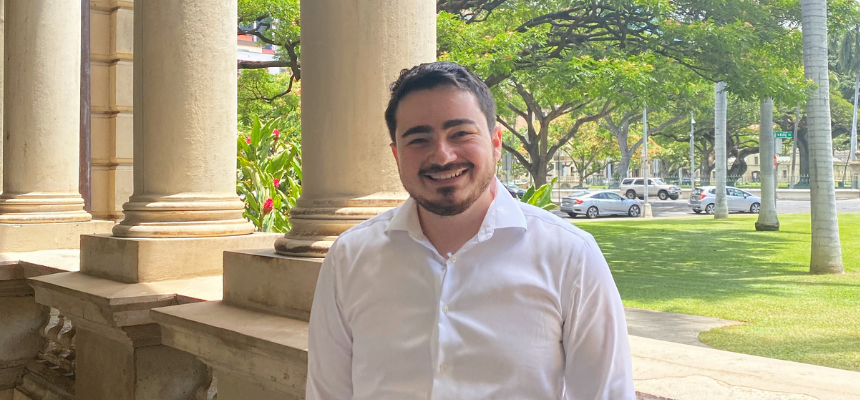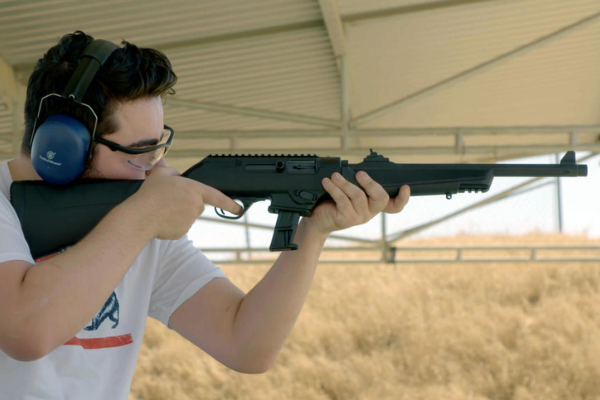
By Gwyneth K. Shaw
In August 2019, a gunman opened fire in a Walmart in El Paso, Texas, killing 23 people and injuring 23 more. Phillip Gomez ’23, then a college student, was moved to action.
“Latinos had been the target of a horrific terrorist attack by a white nationalist and I knew that many Latinos were going to start exploring the prospect of armed self-defense,” he says. “My fear was that they’d be walking into an environment that was hostile and would only make our communities less safe.”
Traditional gun culture — symbolized most prominently by the National Rifle Association — is toxic, Gomez says. Longing to create a better option for Latino gun owners, he founded the Latino Rifle Association (LRA) in 2020.
“I wanted there to be a safe space that had a more community-oriented, socially responsible view on self-defense,” he says.
A string of recent mass shootings, in Uvalde, Texas, Buffalo, Philadelphia, and elsewhere, have reinvigorated the debate over gun control, spurring the recent passage of the first new federal curbs in decades and again throwing the the politics of gun ownership into high relief. The U.S. Supreme Court further spurred the legal discussion with its decision last month in New York State Rifle and Pistol Association v. Bruen, which overturned a New York law requiring a license to carry concealed weapons in public.

Gomez, who’s from Sacramento, makes clear that his group is for people who don’t fit the conservative mold of many gun owners. He says that he and the other members group are unapologetically progressive and often, by his own description, “outright leftist.”
“This is not the NRA for brown people. We have zero tolerance for xenophobia disguised as ‘law and order,’” he says. “The rights of trans people are not up for debate in the LRA. There is a lot of ideological diversity on the left and we don’t gatekeep for a specific philosophy, but truthfully, we aren’t interested in integrating with mainstream gun culture — we want to be a complete alternative to it.”
You don’t have to be Latino to join the group, he says. It has several hundred members and Gomez hopes to one day see chapters all over the Southwest and beyond, teaching community defense and socially responsible gun ownership.
He’s already garnered national press attention, including from CBS News and ABC News.
“I’m able to offer a perspective that isn’t very common in the debate over guns: a politically progressive minority group that supports armed self-defense and is skeptical of gun control because of its racialized impact,” Gomez says.
One example: Gomez thinks the Bruen result was correct, although he has misgivings about the reasoning of the majority opinion, written by Justice Clarence Thomas.
“I think if we are going to give police departments the ability to screen people for carry permits, the standards they use to disqualify people need to be objective and regular,” Gomez says. “However, I think Justice Thomas’s new historical basis test for Second Amendment cases is extreme, even for the already-extreme judicial ideology of originalism.”
When Gomez decided to go to law school, he chose Berkeley because of its robust public interest program, and for what he felt was a less hyper-competitive environment than other top law schools.
Gomez is a member of La Alianza Law Students Association and has found fellowship there. He dips into Second Amendment discourse occasionally, but it’s not his career focus: He’s spending this summer in Hawaii advocating for indigenous rights, and is also interested in police misconduct and digital privacy.
“The sense of community has been really strong. Although Latinos are a pretty small minority here, it really feels like everyone participates in Alianza,” Gomez says. “The school really encourages a lot of student organizations and it seems like everyone can find a home.”